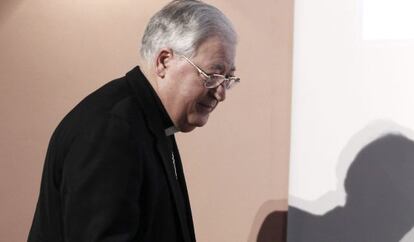Bishop compares abortions with the Spanish Civil War
Juan Antonio Reig Pla says that only "backward societies" practice pregnancy terminations

A Catholic Church official is calling abortion "a silent holocaust."
The bishop of Alcalá de Henares, Juan Antonio Reig Pla, said that since 1985, the year that pregnancy interruptions were legally allowed in some cases in Spain, there have been "two million abortions, many more deaths than during the Spanish Civil War."
His statements were made during Thursday's presentation of a religious event involving the defense of family values, Jornada Mariana por la Familia y la Vida, which will take place on March 29 and 30.
Reig warned that a woman's freedom cannot be "corrupted" by a defense of "the right to terminate the begotten child."
The bishop added that there is no reason to defend voluntary abortion and said the right to life should be separated from the political debate and partisan fighting.
This new statement by the Church comes against the backdrop of a controversial legal reform of existing abortion legislation. If the changes sponsored by Justice Minister Alberto Ruiz Gallardón are passed, the current system of abortion on demand in the first trimester will be replaced with a ban on abortion save for the cases of rape or serious risk to the mother's health.
Bishop Reig underscored that abortions are evidence of a "backward society."
Tu suscripción se está usando en otro dispositivo
¿Quieres añadir otro usuario a tu suscripción?
Si continúas leyendo en este dispositivo, no se podrá leer en el otro.
FlechaTu suscripción se está usando en otro dispositivo y solo puedes acceder a EL PAÍS desde un dispositivo a la vez.
Si quieres compartir tu cuenta, cambia tu suscripción a la modalidad Premium, así podrás añadir otro usuario. Cada uno accederá con su propia cuenta de email, lo que os permitirá personalizar vuestra experiencia en EL PAÍS.
¿Tienes una suscripción de empresa? Accede aquí para contratar más cuentas.
En el caso de no saber quién está usando tu cuenta, te recomendamos cambiar tu contraseña aquí.
Si decides continuar compartiendo tu cuenta, este mensaje se mostrará en tu dispositivo y en el de la otra persona que está usando tu cuenta de forma indefinida, afectando a tu experiencia de lectura. Puedes consultar aquí los términos y condiciones de la suscripción digital.








































